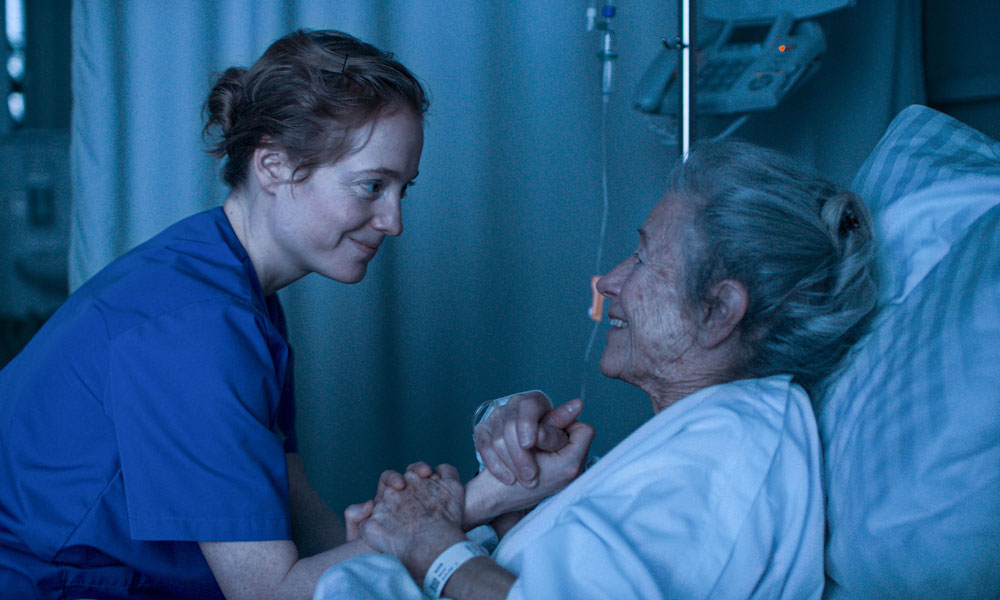Late Shift review - life and death in an understaffed Swiss hospital | reviews, news & interviews
Late Shift review - life and death in an understaffed Swiss hospital
Late Shift review - life and death in an understaffed Swiss hospital
Petra Volpe directs Leonie Benesch in a compelling medical drama

Floria (the superb Leonie Benesch: The Crown; The Teachers’ Lounge; September 5) is a nurse, working the severely understaffed night shift in a Zurich hospital. She is constantly doing three things at once, sanitising her hands, snapping her gloves on and off, measuring medications into syringes, finding veins for IVs and saying, endlessly, “Ich komme gleich” (I’ll be there soon) or “Have you pain on a scale of one to ten?”
Swiss writer-director Petra Volpe’s film is compulsively watchable and brilliantly paced and edited, with an exceptional soundtrack by Emilie Levienaise-Farrouch (All of Us Strangers). From the first moment, in a clever take of an assembly line of laundered blue and white uniforms, we’re plunged into the life of the hospital.
Benesch worked as an intern in the abdominal surgery department at a hospital to prepare for the role and her straight-backed efficiency, steely yet benign and reminiscent of her role in The Teachers’ Lounge, is totally convincing. (The DOP is Judith Kaufmann: Dreamland; Corsage; The Teachers’ Lounge.) Floria and one other nurse, as well as an unconfident student, are the only ones on duty, taking care of an array of patients. These include one elderly lady with dementia and constipation (Margherita Schoch, pictured above) and a man from Burkina Faso (Urbain Guiguemdé). “I have no friends here,” he says. “You have me,” says Floria.
Floria and one other nurse, as well as an unconfident student, are the only ones on duty, taking care of an array of patients. These include one elderly lady with dementia and constipation (Margherita Schoch, pictured above) and a man from Burkina Faso (Urbain Guiguemdé). “I have no friends here,” he says. “You have me,” says Floria.
There’s also Mr Leu (Urs Bihler), who’s waiting in vain for the doctor to come and deliver his diagnosis (Floria knows it’s colon cancer but can’t tell him), a woman with a tumour who suspects that undergoing yet more surgery and chemo is pointless (she jokes that morphine is the only positive aspect), and Mr Severin (Jurg Pluss), who has pancreatic cancer and is the sole private patient on the corridor. He’s always timing Floria on his watch. That’s a record, he tells her: one hour and 15 minutes wait for a painkiller. Finally, towards the end of the shift, driven beyond endurance when he yells that he wants peppermint tea now, not in a minute, she tells him he’s an utter asshole, that he’s going to croak, and throws his 40,000 euro watch out of the window.
But we’re getting ahead of ourselves. Floria is otherwise a model of patience and restraint, calming the woman with dementia by singing to her, an old children’s song about the moon rising. The woman remembers the words, and they sing together, harmonising beautifully. Perhaps a little far-fetched, it’s nonetheless a moving scene. There’s a disconnect between the gleaming, relatively luxurious ward, far better appointed than those in many crumbling NHS hospitals (there are never more than two patients in a room, though some of them complain about sharing) and the desperate circumstances beneath the impression of order. This is very much a film with a message: although it’s particularly marked in Switzerland, the shortage of nurses is a global crisis, with predications by the WHO of a shortage of 13 million nurses by the year 2030.
There’s a disconnect between the gleaming, relatively luxurious ward, far better appointed than those in many crumbling NHS hospitals (there are never more than two patients in a room, though some of them complain about sharing) and the desperate circumstances beneath the impression of order. This is very much a film with a message: although it’s particularly marked in Switzerland, the shortage of nurses is a global crisis, with predications by the WHO of a shortage of 13 million nurses by the year 2030.
In Late Shift, (the title in German is Heldin, meaning heroine) the system is cracking under the strain. A woman with oesophageal cancer dies suddenly. “You didn’t check on her once,” shouts the son. A patient’s antibiotic infusion is several hours late because Floria has no time to attend to it. And Mr Song (Jeremia Chung) develops a severe allergic reaction after Floria mixes up his medication. “Everyone makes mistakes,” the doctor reassures her, but Floria is devastated and takes a few minutes off to weep quietly beside a window, while raindrops spatter the glass.
Although the final scenes are too neat and sentimental – patients are resting peacefully or playing chess together and the private patient has even apologised for being an asshole – the image of Floria in her blue uniform, pushing her trolley up the ward, her phone trilling, remains indelibly powerful.
rating
Explore topics
Share this article
The future of Arts Journalism
You can stop theartsdesk.com closing!
We urgently need financing to survive. Our fundraising drive has thus far raised £49,000 but we need to reach £100,000 or we will be forced to close. Please contribute here: https://gofund.me/c3f6033d
And if you can forward this information to anyone who might assist, we’d be grateful.

Subscribe to theartsdesk.com
Thank you for continuing to read our work on theartsdesk.com. For unlimited access to every article in its entirety, including our archive of more than 15,000 pieces, we're asking for £5 per month or £40 per year. We feel it's a very good deal, and hope you do too.
To take a subscription now simply click here.
And if you're looking for that extra gift for a friend or family member, why not treat them to a theartsdesk.com gift subscription?
more Film
 Blu-ray: The Sons of Great Bear
DEFA's first 'Red Western': a revisionist take on colonial expansion
Blu-ray: The Sons of Great Bear
DEFA's first 'Red Western': a revisionist take on colonial expansion
 Spinal Tap II: The End Continues review - comedy rock band fails to revive past glories
Belated satirical sequel runs out of gas
Spinal Tap II: The End Continues review - comedy rock band fails to revive past glories
Belated satirical sequel runs out of gas
 Downton Abbey: The Grand Finale review - an attemptedly elegiac final chapter haunted by its past
Noel Coward is a welcome visitor to the insular world of the hit series
Downton Abbey: The Grand Finale review - an attemptedly elegiac final chapter haunted by its past
Noel Coward is a welcome visitor to the insular world of the hit series
 Islands review - sunshine noir serves an ace
Sam Riley is the holiday resort tennis pro in over his head
Islands review - sunshine noir serves an ace
Sam Riley is the holiday resort tennis pro in over his head
 theartsdesk Q&A: actor Sam Riley on playing a washed-up loner in the thriller 'Islands'
The actor discusses his love of self-destructive characters and the problem with fame
theartsdesk Q&A: actor Sam Riley on playing a washed-up loner in the thriller 'Islands'
The actor discusses his love of self-destructive characters and the problem with fame
 Honey Don’t! review - film noir in the bright sun
A Coen brother with a blood-simple gumshoe caper
Honey Don’t! review - film noir in the bright sun
A Coen brother with a blood-simple gumshoe caper
 The Courageous review - Ophélia Kolb excels as a single mother on the edge
Jasmin Gordon's directorial debut features strong performances but leaves too much unexplained
The Courageous review - Ophélia Kolb excels as a single mother on the edge
Jasmin Gordon's directorial debut features strong performances but leaves too much unexplained
 Blu-ray: The Graduate
Post #MeToo, can Mike Nichols' second feature still lay claim to Classic Film status?
Blu-ray: The Graduate
Post #MeToo, can Mike Nichols' second feature still lay claim to Classic Film status?
 Little Trouble Girls review - masterful debut breathes new life into a girl's sexual awakening
Urska Dukic's study of a confused Catholic teenager is exquisitely realised
Little Trouble Girls review - masterful debut breathes new life into a girl's sexual awakening
Urska Dukic's study of a confused Catholic teenager is exquisitely realised
 Young Mothers review - the Dardennes explore teenage motherhood in compelling drama
Life after birth: five young mothers in Liège struggle to provide for their babies
Young Mothers review - the Dardennes explore teenage motherhood in compelling drama
Life after birth: five young mothers in Liège struggle to provide for their babies
 Blu-ray: Finis Terrae
Bleak but compelling semi-documentary, filmed on location in Brittany
Blu-ray: Finis Terrae
Bleak but compelling semi-documentary, filmed on location in Brittany
 Oslo Stories Trilogy: Sex review - sexual identity slips, hurts and heals
A quietly visionary series concludes with two chimney sweeps' awkward sexual liberation
Oslo Stories Trilogy: Sex review - sexual identity slips, hurts and heals
A quietly visionary series concludes with two chimney sweeps' awkward sexual liberation

Add comment